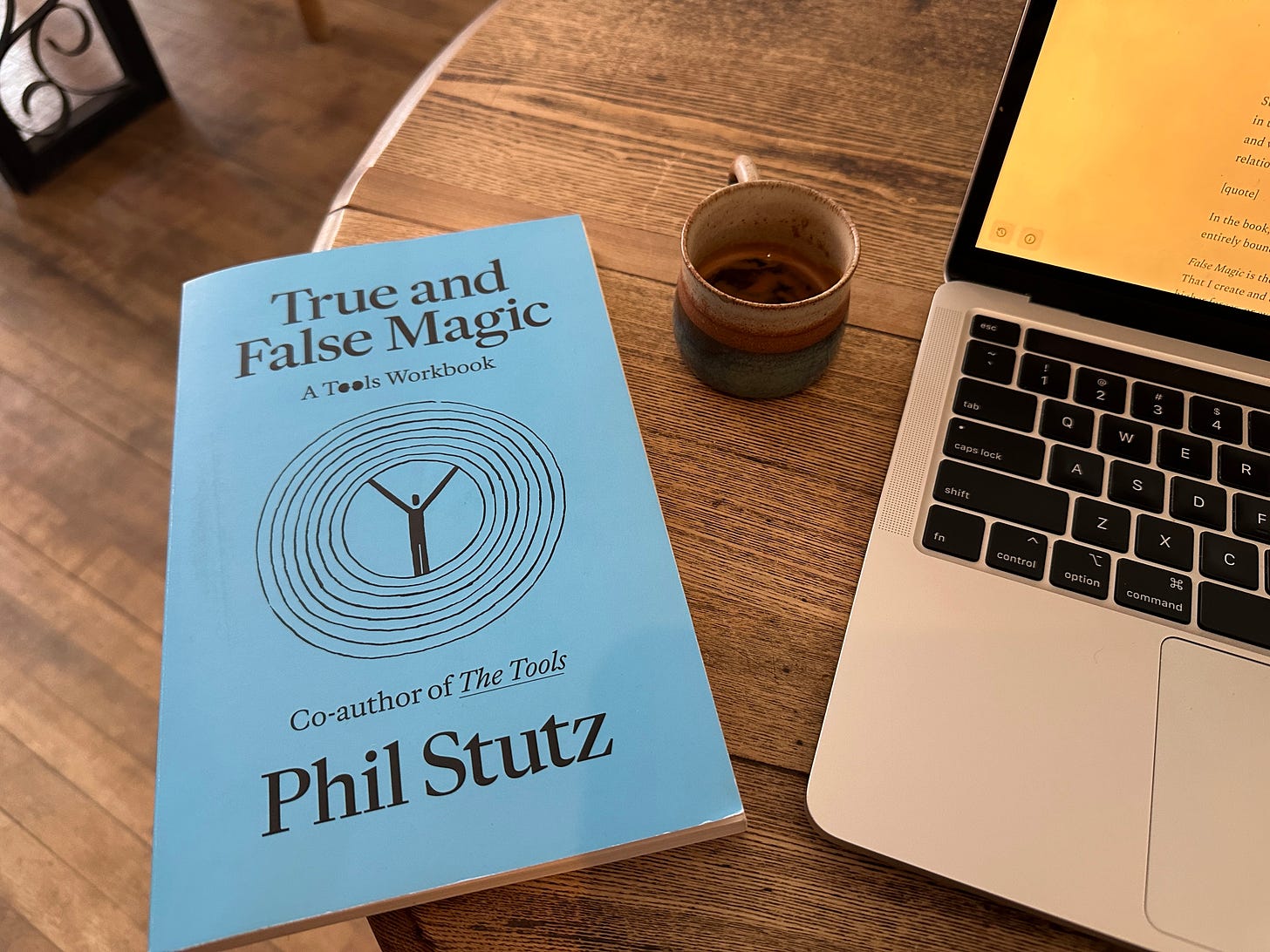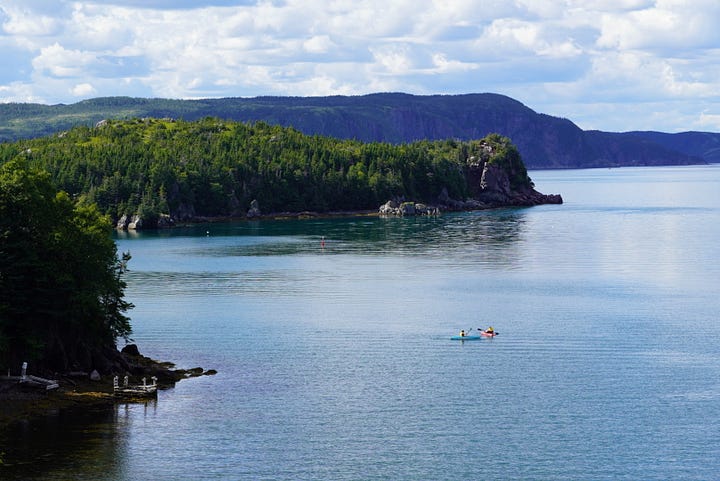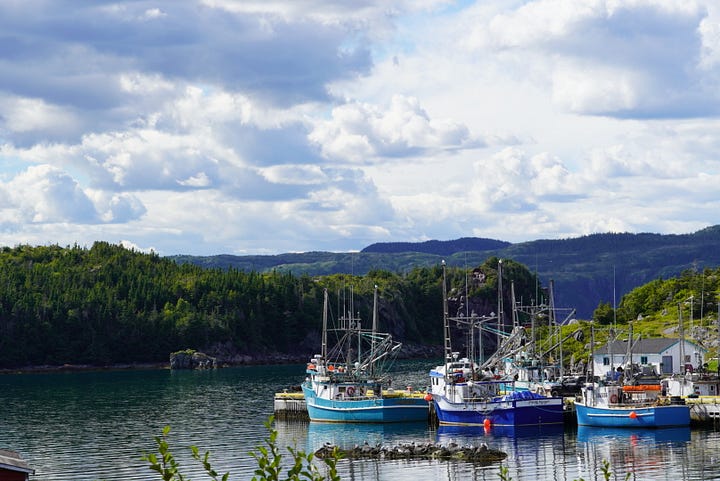The Timelessness Trilogy 3
What to do now

I hope so far I’ve made a compelling case that culture codes for time, and that if you can find a way to move through time in the context you’re in, you’ll find something magic there.
Inevitably, modern humans read something like this and think ‘But what do I do about all this? Sure, I could recognize my cultural context, and even try to live more seasonally - but what’s the first step?’
Aha! That is exactly the right question, because the first step is all there is. The next best decision, the next first track. What we’re ultimately trying to do is unlock the aforementioned magic, and we do this by finding our work, finding our people, and finding our place.
I recommend you settle in for this one - it will be a wondrous journey. You’ll be a modern Substackian Bilbo Baggins, tucked into your little nook of a world, but feeling like you’re on a grand adventure.
It is no surprise to me (synchronicity again) that while I was writing this trilogy, a modern mensch decided to write his most practical book yet. On March 25th, Phil Stutz released True and False Magic. Inkfingers in every corner of the globe rejoiced in unison. We finally had what we’ve long wanted - equal parts new Stutz material, and workbook where we could learn to apply The Tools to our daily lives and forge a relationship with the physical copy by putting pen to paper.

In the book, Stutz draws the distinction between True Magic and False Magic - both entirely bound up by time.
False Magic is the sense that I can do all of this alone. That I don’t need anyone else. That I create and travel and write and read and make things alone. That I don’t need higher forces, or even faith, anymore because we’re in the era of scientism and if you can’t prove it to me it isn’t worth anything. We’ve all but abandoned Sunday morning.
In our hubris, we fail to realize that we are part of a grand canvas - never separated from the whole.
‘There is no such thing as a singular individual human being…Nothing permanent, and nothing that has real value, could ever be created or supported by one singular person. It’s impossible. You cannot work alone…Fake magic is the conceit that I can do all of this myself.’ - Stutz
Anybody who tells you they can is not to be trusted, or at the very least delusional (with time I believe we can win them back).
It’s not surprising to me - and certainly not to Stutz - that power hungry despots and sociopaths use time as the very thing to convince us of their false magic. The tool of choice is often nostalgia - a tactic entirely dependent on revisionist history (and time).
Nostalgia is a uniquely useful tool here because it hijacks the human need for certainty. The playbook is simple:
Paint a picture of a time that was great for a certain person at a certain time - this doesn’t even have to be true because people won’t go looking for the proof.
Tell them that getting back to that place and time is possible.
Convince them that ‘I am the only one who can take you there.’
Run. Run immediately. Find the reluctant leader who isn’t certain that they’re right - but has done the work to know that they’re on a path to becoming less wrong. This will miss the non-locals in our community entirely - but that's why I supported my friend David Alston’s bid for regional politics, and I wish I did more to help.
If False Magic is the sense that I can do it alone, True Magic is the recognition that nothing is created alone - nothing exists in a vacuum.
“Real magic is knowing that you are accessing power as a part of the greater whole, that you are connected to a group and forces higher than yourself. Nothing in the universe is permanent, or valuable, unless it’s done in partnership.” - Stutz
Even in the accelerator that I run on the East Coast of Canada, our message is a singular one - be in deep relationship with your customers. Your customers can influence product innovation and growth in ways you can’t yet imagine. The first step is to build something they want and nurture a relationship over time.
Doing this all at once sounds daunting, doesn’t it? We overcome the dauntedness by heeding Stutz’s wise advice - to live… ‘in the world of small things.’ Do small things, do them consistently, add to them over time. If you have the courage to work this process over and over again - the humble stumble - you become yourself, and that’s the very point of all the doing in the first place.
We can find the first track in our place, in our work, and with our people.
“You must understand that your potential is part of your birthright.” - Stutz
All we need is a point of view, a set of tools, and a lot of time. I hope that in this post you learn how to find your place (even if you feel out of place), find your work (even if you’re out of work), and how to find your people (even if you’re alone).
Here are 5 Tools used in this post.
True and False Magic - from the penultimate Phil Stutz
Steve Rinella on the Tim Ferriss Show - during a rather historic run
The singular Gabor Mate, talking to the equally singular Theo Von
My personal photo archives - an ode to People & Place
The wonderful, musical writing of Josey Grace, and the thoughtful, worldly writing of Russel Max Simon
Are you interested in getting access to all of the tools used in every post on People & Place? Let me know in the comments and I’ll build something new and interesting for this community.
Our Place (the leavers and the stayers), Our Work (vocation), Our People (alone is no good)
At some point, soon after my 30th birthday, sitting in a cafe in the historic district of Mexico City, it occurred to me that the only true path to whole human health runs through a deep connection to people and place. An epiphany of sorts. That we are all marked by the place we come from, in ways we don’t fully understand, but we damn well feel. I marked the occasion-of-revelation with a photo and I’m not surprised it’s one of my favourites. I haven’t touched the thing. It’s washed out. It’s perfect.
Travel is a conundrum - we leave home at a young age, pushed by some cosmic force. We see things, we go places, we meet people. We do so to try and find what we’re looking for, only to realize that it’s only findable once we - inevitably - come home. The bittersweet curse. I’ve seen it a thousand times.
It’s the natural tension between the leavers the stayers, and of finding home. A rather wonderful Substack friend wrote a lovely essay on the topic, and we shared some thoughts back and forth (a more powerful community on social, I have yet to find).
This was - precisely - how I felt growing up on the East Coast of Canada in the 1990s. That I was certainly from this place, but not of this place. I loved maps and books about the world and so at a young age had grand visions of Dark Star Safaris, It Was Always Amsterdams, Boomerangs, and Sometimes I Miss Londons.
Over time, I was led back home - the leaving had led to the staying - and it was in the staying that I rediscovered home. That is very much a decision. You choose to stay, and in the choosing you make it sacred. That is literally the etymology of the word - the staying means you’re sacrificing all of the places you could be, in favour of the place you are. You choose to be a stick in the mud, and come to learn that that commitment and depth is greater than all the breadth in the world. One inch thick, but two miles deep.
Oddly I feel more connected to my heritage than the more modern iteration of my settler culture. But I feel the salt air, cold wet moss, and seagull song all the same. I’m home.




It’s hard to overstate how much our place influences who we become. When we’re young all we have are instincts. Inclinations about how the world really works and our place in that world. We gravitate toward certain things and we move-by-magnetism away from other things. We use those early inclinations to build skills and eventually we deploy those skills on behalf of some greater whole. Ideally, in the form of an apprenticeship.
That is the Mastery approach to work - and in it we can discover a great sense of meaning. We can find ourselves through our work. Our vocation - being called toward something that feels like it is uniquely us.
“The universe is constructed with each person having a mission, which is not a dramatic thing…You’re supposed to advance your potential, while simultaneously accepting the fact that if this is the whole world, every single person has a niche. If you don’t find your niche, you won’t be whole. And if you’re not whole in this area, you won’t achieve total wholeness.” - Stutz
I’ve come to see it this way - we find our work by combining Robert Greene’s Mastery concept, with what I’ve come to call the Steve Rinella Formula. You’ll want to pay attention here. This is good advice. This is very good advice. This advice is so good that Susbtack needs a pay-only-for-this-paragraph-button. This advice is so good that if you fail to heed this advice your household will be cursed for seven generations. Listen closely.
“What’s the solution? ‘It’s simple,’ Minkkinen says. ‘Stay on the bus. Stay on the fucking bus.’ … But it begins at all only for those who can muster the patience to immerse themselves in the earlier stage - the trial-and-error phase of copying others, learning new skills, and accumulating experience.” - Burkeman
But, as Steve Rinella so wisely points out, the copying others is a risk if done too explicitly. We’re tempted, in any pursuit, to copy those that we’ve seen do the thing at the highest level. But if we copy them too closely, we become a mirage of that thing. We never quite get there because those we’re copying are, by definition, exceptional. They are not to be copied. It isn’t possible. They’re ichi-go ichi- e - once in a lifetime, never again.
In my world, the written world, it would be like trying to write fantasy like J.K Rowling. It would be like trying to write the Portugal chapter in A Cook’s Tour. It would be like trying to write Dirt, if you write about food. It would be trying to write sombre, observational non-fiction like Joan Didion. It would be like trying to write about Alaska like John McPhee. It’s never going to happen. That’s not for you pal. That thing is gone and it ain’t comin’ back.
The risk of copying your heroes too closely is as practical as philosophical - even if you succeeded in copying them you’ll be seen as a knock off and that just won’t do. But perhaps - PERHAPS! - we could combine all of them, bits and pieces, into a recipe that allows us to create something that is uniquely us. Character like Rowling, place like McPhee, feeling like Didion, and people like Bourdain.
If we can do that - if we can do that and maintain our own unique voice - then we’re on the path. We’ve done our work. We’ve implemented the Steve Rinella Formula.
We pre-suppose that our work can only mean our job. I do believe that if we can tie our livelihood to our vocation, we’ve achieved some kind of alchemy - life becomes more fluid - but our work can also be found in the things we love. The things we do because we can’t imagine not doing them. Where this is no consideration whatsoever of the potential gain, financial or otherwise, because the thing itself is the reward. In fact, more time to do the thing is all the reward we could possibly imagine.
“…the hobbyist is a subversive: he insists that some things are worth doing for themselves alone, despite offering no payoffs in terms of productivity or profit. The derision we heap upon the avid stamp collector or train spotter might really be a defense mechanism, to spare us from confronting the possibility that they’er truly happy in a way that the rest of us - pursuing our telic lives, ceaselessly in search of future fulfillment - are not.” - Burkeman
Publisher Karen Rinaldi calls this ‘Freedom to pursue the futile.’ Acts of pure creation that feel good in a way that isn’t quite explainable. Certainly not easy to understand it’s ‘return on investment’ because even trying to calculate such a thing would be foolish. It would cease to be the thing it was.
“We do not live in a meaningless universe - but you are required to harvest the meaning. The deepest part of evolution is that we are forced to create…You must push to enter the moving world.” - Stutz
The ancients - and even the modern wisers - felt the same way about leisure and contemplation because ‘…it was worth choosing for its own sake, whereas other virtues, like courage in war, or noble behavior in government, were virtuous only because they led to something else.’
Modern humans - especially in urban environments (for some reason) - can scarcely imagine spending time this way. Leisure, if there is any at all, can only be seen as a means to a socio-economic end. To some other frenetic, productive state. We subconsciously wish it weren’t so, but it is so, and we know it’s so because we can feel that it is so.
“Rest is permissible, but only for the purposes of recuperation for work, or perhaps for some other form of self-improvement…It becomes difficult to enjoy a moment of rest for itself alone, without any regard for any potential future benefits, because rest that has no instrumental value feels wasteful.” - Burkeman
We know this to be ridiculous, but we can’t seem to stop. We live in a seemingly endless day of screens and to-dos and reminders, only to come home to a vegetative, idle state seated in front of Love is Blind. If our days are soulless and stressful, we crave the mindless. I’m not trying to be judgemental here, I’m simply an observer and that’s what I’m observing.
What to do about this, perhaps, is to not do.
“In order to most fully inhabit the only life you ever get, you have to refrain from using every spare hour for personal growth.” - Burkeman
Or, according to Simone de Beauvoir, ‘…If the satisfaction of an old man drinking a glass of wine counts for nothing…then production and wealth are only hollow myths; they have meaning only if they’re capable of being retrieved in…living joy.”
In Stutzian philosophy just being aware of all of this is not enough. It’s the modern therapy trap - that if you only make someone aware of what’s happening in their subconscious, the awareness itself is what will bring relief. I think - even if we don’t feel comfortable saying it publicly - that we all know this is some sort of voodoo. It won’t work. There has to be something to do about all of this - a tool. Actionable steps that you can take to implement change in your life right now - the only thing that will create the confidence needed to move forward - to believe that change is possible, and I can inspire it by taking a step forward here today, and engaging with the real world.
According to Stutz, this means living ‘…in the world of small things.’
“You have to measure your faith in the smallest possible increments - there’s a tool to do this. It’s a relational pyramid. It has to do with how you find and activate your Life Force. You must start at the very bottom. Once you do that - even on the smallest level - it will affect everybody around you.” - Stutz
If we can take a small step today toward the ultimate goal, we build confidence, and then parlay that confidence into consistency. Even if that means walking around the block for God’s sake.
Because True Magic is co-creation - never alone, never in a vacuum - our place and our work are direct conduits to our people. This is the modern myth of the ‘Digital Nomad’.
“… ‘digital nomad’ is a misnomer - and an instructive one. Traditional nomads aren’t solitary wanderers who just happen to lack laptops; they’re intensely group-focused people who, if anything, have less personal freedom than members of settled tribes, since their survival depends on their working together successfully.” - Burkeman
When we’re alone and wandering about, we’re out of step with the rest of the world and so we begin, over time, to feel removed from it. Like the rest of the world is glimmered somehow and that we can’t quite access it. We can’t reach out and touch it, we can only observe it, like a painting in a museum.
Like when writer Mark Manson “burst into tears in a small suburb in Japan watching families ride their bikes together in a park,” having realized that his chosen nomadism “had put such ordinary pleasures beyond reach.” - Burkeman
Perhaps that’s evolutions way of baking into us the need for other people. Reminding us that we are but a tiny ingredient in a grand recipe, not the chef.
“The digital nomad’s lifestyle lacks the shared rhythms required for deep relationships to take root.” - Burkeman
I see the Life Force pyramid as a you-shall-not-pass situation. You begin in the world of small things, improving your relationship with your physical body (80% of the short term fix) - ideally outside, engaging with the natural environment of your place. We graduate to the second rung of the pyramid - to our people and the importance of being in relationship with them. Finally, after enough time has passed, we discover ourselves, often in what we're called toward. In our vocation. In the wonderful rhythms of our work. In the humble stumble.
All we need is a point of view, a set of tools, and a lot of time.
See you on the road.
“God is a process…All of creativity is an endless stream of death and rebirth.” - Stutz








